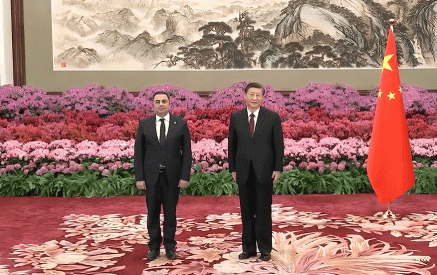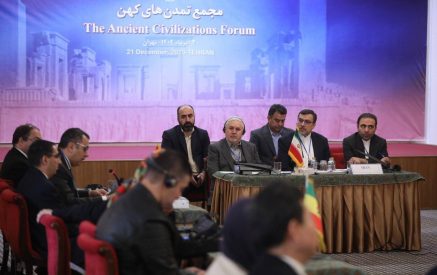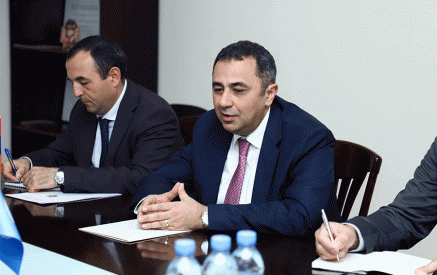Remarks by the Deputy Foreign Minister of Armenia Vahe Gevorgyan at the 7th Ministerial meeting of the Ancient Civilizations Forum
“Honorable Dr. Hossein Amir-Abdollahian,
Honorable Mr. Ezzatollah Zarghami,
Excellencies, dear colleagues,
Read also
It is a great pleasure to attend the Seventh Meeting of the Ancient Civilizations Forum in Tehran. I take this opportunity to express gratitude to the Government of the Islamic Republic of Iran for excellent organization of the Forum and for the warm-hearted welcome and hospitality.
I would like to extend my most sincere congratulations to the Iranian government and people on the occasion of Yalda Night celebrations. Yesterday’s special cultural program hosted by the Ministry of Cultural Heritage, Handicrafts, and Tourism showcased the rich cultural heritage of Iran.
Armenia and Iran share deeply rooted traditions and cultural links. The Water Ceremony, known as Tirgãn in Persian or Vardavar in Armenian is case in point. These traditions, dating back to ancient times, serve to strengthen the friendly ties between the two peoples.
In fact, as we stand upon this ancient land, where the illustrious Behistun Inscription etches its narrative onto the rocky canvas of history, we are reminded of the significance role of Iran in the destiny of the ancient peoples of the region. Carved over two and half millennia ago by the decree of Darius the Great, this trilingual marvel in Old Persian, Elamite, and Babylonian stands as a testament to the ancient history and culture of the Iranian people. It also acts as a linguistic and historical bridge, offering insights into the diverse cultural tapestry of the region. Notably, first time ever the very name of Armenia surfaced in this historic document, while in Babylonian language our country was called Urartu, thus making unbreakable line and tradition of Urartu/Armenia. As we stand in this ancient terrain, let us reflect on the enduring impact of the inscription, fostering a shared heritage that binds us with both nearby and distant communities.
We commend Iran’s unwavering commitment to protection of the cultural heritage of diverse communities, notably the Armenian cultural legacy. This commitment is evident in the preservation and promotion of such landmarks in Iran, as the St. Thaddeus Apostle Monastery, an ancient Armenian church dating from the 4th to 7th centuries and associated with the Apostle Thaddeus. The inclusion of the St Thaddeus, St Stepanos and the Chapel of Dzordzor Armenian Monastic Ensembles of Iran in the UNESCO World Heritage List, as well as the inscription of the pilgrimage to St Thaddeus monastery on the UNESCO Intangible Cultural Heritage of Humanity list, coupled with the government’s support for pilgrimage traditions, reflects Iran’s pivotal role in safeguarding and celebrating Armenian cultural heritage beyond the borders of the Republic of Armenia.
As a country of Christian tradition sharing common borders with Iran, Armenia takes pride in traditionally and yet evolving friendly relations with its neighbor, an example of mutual respect and intercultural dialogue anchored in protection of the millennia-old heritage.
Mr. Chair,
Armenia values the Ancient Civilizations Forum as a pivotal platform for cultural dialogue and cooperation, capable of addressing the significant challenges confronting our increasingly globalized world. We are committed to actively supporting and contributing to collective endeavors aimed at bolstering intercultural dialogue, mutual understanding and tolerance. This is also an important opportunity to review the progress in our cooperation on promoting the common historical and cultural heritage and identify the gaps in this regard.
Preservation of tangible and intangible cultural heritage of humankind is key element in promoting effective policies aimed at strengthening peace, sustainable development, social cohesion, tolerance, non-discrimination and human rights.
Armed conflicts in different parts of the world have had devastating impacts on cultural and religious monuments. Improving data collection, introduction of reliable monitoring and evaluation mechanisms, fostering partnerships and information sharing, as well as use of digital and satellite technologies and innovative solutions, create a vast toolkit of instruments to help to protect cultural heritage and prevent cultural vandalism.
In the Tiwanaku Declaration on 13 July 2018 the members of the Forum deplored the fact that armed conflicts have become a serious threat to the integrity of the world heritage monuments. As stated in the Baghdad Declaration of 4 December, 2022, our nations share deep concerns regarding the destruction, looting and appropriation of cultural property, including religious sites.
In this regard, Armenia believes that ACF member states should exert additional efforts to promote cooperation within prominent global organizations, such as the UNESCO. There is an untapped potential in promoting the remarkable cultural heritage of our ancient civilizations, as the shared wealth of all humankind. Armenia stands ready to pursuing joint initiatives together with the members of the Forum within the framework of the UNESCO and other multilateral fora.
Mr. Chair,
Regrettably, the Armenian cultural heritage has become subject to ongoing destruction, desecration and appropriation in Nagorno-Karabakh. Azerbaijan’s most recent use of force in September 2023, resulting in ethnic cleansing of the entire indigenous population of Nagorno-Karabakh, has further endangered the Armenian cultural heritage.
The state-sponsored policy of deliberate destruction and alteration of the identity of cultural heritage sites represents a challenge not just to Armenia but to all of humanity. The gravity of the situation requires urgent efforts by the international community. In this regard, we support deployment of the UNESCO’s independent expert mission to Nagorno-Karabakh, a mission that Azerbaijan has thus far obstructed.
We hope that through our collective efforts and unwavering dedication to the values of humanity, peace, and the protection of cultural heritage, we will be able to make a meaningful contribution to the protection of the endangered Armenian cultural heritage in and around Nagorno-Karabakh.
In conclusion, I wish to reiterate Armenia’s commitment to the cooperation with partner countries of the Ancient Civilizations Forum to jointly promote and protect the common heritage, which is of irreplaceable value to the entire mankind as unique expression of history, identity and cultural memory.
I thank you for attention.”
Ministry of Foreign Affairs Government



























































